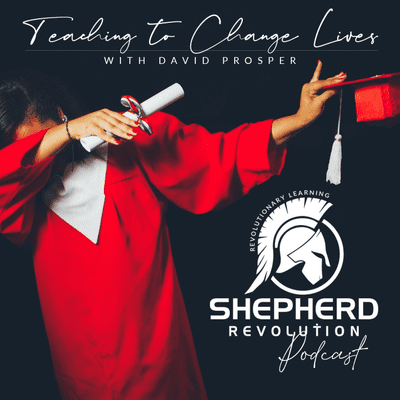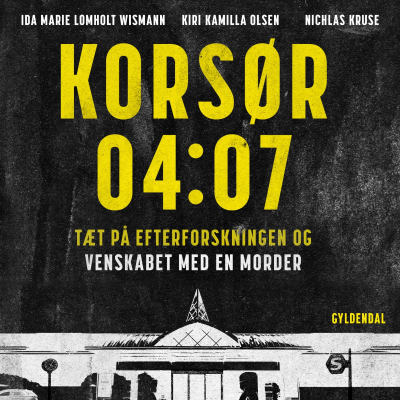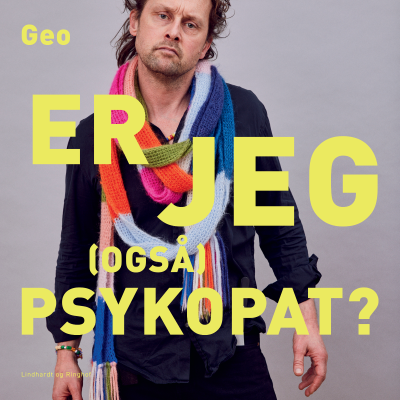
Shepherd Revolution Podcast with David Prosper
Podcast af David Prosper
The Shepherd Revolution Podcast is for educators, parents and leaders who are doing education differently. We focus on being the solution to the education evolution by bringing timeless strategies, duplicable systems and neuroscience.
Prøv gratis i 60 dage
99,00 kr. / måned efter prøveperiode.Ingen binding.
Alle episoder
7 episoder[INTRO IN SHOW] Hey, it's David Prosper and welcome to the Shepherd Revolution Podcast, today we’re going to talk about the law of encouragement. You are going to receive practical, applicable transformational value as an educator, parent, and leader so YOU can start educating differently today. Where are on episode 6 of the series - Teaching to change lives! Summary of last episode: In the last episode we uncovered the law of the heart by understanding that The law of the heart is teaching that impacts is heart to heart through the ethos, logos and pathos. * Teaching is what you do; learning is what your students do. * Know your students. The more you know of their needs, the better able you are to meet them. * Be willing to become vulnerable in front our students. Let them know what you’re struggling with and what you’ve struggled with for years. Today we are going to dive into the law of encouragement! Act I Intro to the Law of encouragement (Duration: 10mins ) * “Do what you can, with what you have, where you are.” – Theodore Roosevelt. * What would it look like to express this to our learners? our spouses? Our children? Our staff? * * it would communicate these concepts like: ownership, curiosity, meeting needs, usefulness, challenge, recognition and approval. * The number one problem in education today is the failure to motivate learners….to get them off the bench and get them in the game of learning. * I believe that the MQ (motivational quotient) is more important than their IQ. * There are alot of learners who graduate that are highly qualified, but utterly useless. * Their problem isnt lack of ability, but lack of application. * The law of encouragement is this: teaching tends to be most effective when the learner is properly motivated. * The word I want us to focus on is “properly” in that definition, because it tells us there’s such a thing as improper motivation. * Here are some improper motivation: * Guilt * Fear * Deception * Desperation ● Turning point - Now that we have the understanding that The law of encouragement is most effective when the learner is properly motivated.Lets transition to talk more about the two levels of motivation Act II Two levels of motivation Awareness of Need * The first is extrinsic motivation---this is motivation from without. (give examples - prenda & life) * The second is more significant--intrinsic motivation---which comes from within (give examples - prenda & life) * Our goal as educators, parents and leaders in all extrinsic motivation is to trigger intrinsic motivation. * As an educator - a parent - a leader we need to help the develop our learners into self-starters * We want them to do what they do, but because they themselves have chosen to do it. Good Training * We motivate people by correctly structuring their experience. * Training involves four major stages: * 1. The first stage is the Telling stage: this is when we are just talking at them, vomiting information, it's typically a one sided conversation. * 2. The 2nd stage is the Showing stage: this is when we provide a model - this is when we’re leading by example - give an example of prenda * 3. The 3rd and 4th stage involves: doing, but in different ways: first in a controlled situation, then in uncontrolled, real life-situations. ● Turning point - Now that we have the understanding about the two levels of motivation and how it addresses the awareness of learners needs and the importance of good training. Let's dive into the psychology of motivation! Act III The Psychology of Motivation * Have you ever wondered at the way certain people bring out the best in others? * They seem to know how to get an extra effort from the people they lead - they seem to possess a knack for inspiring people. And this remarkable skill at the art of motivation makes them highly successful at almost everything they do. * On the other hand, there are those who seem to bring out the worst in us. When we’re around those people we feel incompetent, suffocated, and discouraged. * There is difference between motivation and manipulation * Manipulation- is secretive about intentions * Motivation - is transparent about intentions * When someone is a manipulator they try to persuade people to do something that is not in their best interests, but in theirs. * When someone is a motivator they strive to find goals that will be good for both sides, then they create a high-morale partnership to achieve them. * Three ways to practice the psychology of motivation * Expect the best from people you lead * Believe the best intentions * Creating a climate in which to grow Summarize: * Today we learned about: * The law of encouragement is most effective when the learner is properly motivated * the two levels of motivation and how it addresses the awareness of learners needs and the importance of good training * the psychology of motivation! Closing remarks + teaser for next episode Next episode on this series we’ll be discussing the law of readiness- and how educators, parents, leaders can create environments that prepare the learners to learn. Its going to be great! And you’re going to LOVE IT - subscribe today. Closing Tagline: “Remember, be the solution for the education evolution
[INTRO IN SHOW] Hey, it's David Prosper and welcome to the Shepherd Revolution Podcast, today we’re going to talk about the law of the heart. I promise to bring you applicable value that you as an educator, parent, and leader can start educating differently starting today. Where are on episode 4 of the series - Teaching to change lives! Summary of last episode: In the last episode we uncovered the law of communication by understanding that The word communication means “common”, that all communication has three essential components: thought, feeling, and action.Then diving deep on how changing our language can change our lives Today we are going to dive into the law of the heart! Act I Intro to the Law of the heart (Duration: 10mins ) * Teaching that impacts is not head to head, but heart to heart * And that's the law of the heart - teaching that impacts is heart to heart * Socrates summarized the essence of communication with three fascinating concepts that he called ethos, pathos and logos. * Pathos - embraced compassion * Logos embraced content * ethos , as socrates thought of it, meant establishing the credibility of the teacher--his credentials. * He understood that who you are is far more important than what you say or do, because it determines what you say and do. * Who you are as person is your greatest leverage as a speaker, a persuader, and a communicator. * You mist be attractive to those who learn from you. They must trust you, and the mor they trust you, the more you communicate to them. * pathos , or compassion, concerns how the teacher arouses the passion of his hearers and massages their emotions. Socrates knew that your emotions must run in the direction of your actions. Thats the secret to motivation, because Yahweh created us as emotional, feeling, beings. * Logos involves engaging the mind and gives understanding. It provides reasons for the action you want the learners to take so they see how logical and reasonable that action is. * As an educator you can, of course, teach without character, without compassion, without content. But think with me what that does to the learner. * For the teacher’s character is what produces the learner’s confidence. * Second its our compassion that produces the learners’ motivation - if I sense that you love me, I’ll be eager to do all kinds of things you want me to do. * Why did the disciples follow Yeshua? Its simple: he loved them. The Bible tells us, “when Christ saw the multitudes, he was moved with compassion for them. * Men and women and youth and children are all drawn to a person who loves them. * third , its your content that produces the learners perception. You as the educator have seen it----not I as the learner see it. I understand it, I have discovered it. It is mine, woven into the fabric of my life. * The greatest communicators---the greatest teachers--are not necessarily the people up front with high visibility. They are the people who have great heart. They communicate as a total person and they communicate to the total person of their hearts. ● Turning point - Now that we have the understanding that The law of the heart is teaching that impacts is heart to heart through the ethos, logos and pathos, lets jump into the teacher---learning process: Act II The Teaching---learning process * Think for a moment about what teaching and learning really are. * Teaching is causing. Causing what? Causing people to learn. That's the simplest definition I know. * There's such an important relationship between teaching and learning. * It's the teaching--learning process! * These words are inseparable. If the learner does not learn, we have not taught. * Now check it out: teaching is what you do; learning is what your students do. (repeat 3x) * We never say “learned him” because that would be impossible. The student must do the learning; all the teacher can do is teach. * So the focus in teaching is primarily on what you a the educator do, and the focus in learning is primarily on what the student does. * But we test the effectiveness of our teaching not by what we do, but by what the students do as a result of what we do - learning = changing * When someone has learned, that person will have changed. Transformation- a metamorphosis happens! * Three ways to teach with heart: 1. Know your students. The more you know of their needs, the better able you are to meet them. 2. This takes commitment of course, and it takes time, and thats where we lose a lot of teachers. But theres no magic formula. Good teaching has a price tag. You’ve got to be willing to pour out your life. It means getting personally involved with your students, both in and out of the classroom, both formally and informally. It means finding time to just talk with them. It means inviting them to your home. * We can impress people at a distance, but you can impact them only up close. And the closer you are to them, the greater and more permanent the impact. 1. Earn the right to be heard. You cant walk out on the street and tell the first guy you meet that you what his problem is. Even if you do know what his problem is, i can guarantee you wont get through to him. 2. Credibility always precedes communication 3. That is why I am convinced that the most successful educators have extraordinary students, because they have earned the right. They’re not the people you see on major platforms, but they’re the people who change lives! 4. Be willing to become vulnerable before your students. Let them know what you’re struggling with and what you’ve struggled with for years. 5. If your class is children, tell them what you struggled with when you were their age. 6. They’ll latch on to it and love it. If they’re teenagers, let them know you were a teenager once and had your share of problems. 7. One of the greatest responses I get from students is when I mentioned the problem I had with misbehaving in class. They can easily identify with that, but not with my successes. Same goes for adults too. 8. Remember most people will tend to see you in terms of where you are now, rather than in light of where you’ve come from and what you’ve gone through. 9. They didnt see the process. Yet by the grace of yahweh you’ve come a long way. 10. Summarize: * Today we uncovered the law of the heart by understanding that The law of the heart is teaching that impacts is heart to heart through the ethos, logos and pathos. * Teaching is what you do; learning is what your students do. * Know your students. The more you know of their needs, the better able you are to meet them. * Be willing to become vulnerable before your students. Let them know what you’re struggling with and what you’ve struggled with for years. Closing remarks + teaser for next episode Next episode on this series we’ll be discussing the law of encouragement- and how educators, parents, leaders can become better encouragers. Its going to be great! And you’re going to LOVE IT - subscribe today. Closing Tagline: “Remember, be the solution for the education evolution
[INTRO IN SHOW] Hey, it's David Prosper and welcome to the Shepherd Revolution Podcast, today we’re going to talk about the law of communication. I promise to bring you applicable value that you as an educator, parent, and leader can start educating differently starting today. Where are on episode 3 of the series - Teaching to change lives! Summary of last episode: In the last episode we uncovered the law of activity by diving into how important it is to involve the learner into the learning process. And how its all about purposeful work rather than busywork. Today we are going to dive into the law of communication! Act I Intro to the Law of Communication (Duration: 10mins ) * Communication is no piece of cake and if you’re a student of communication you know how difficult it is. * George Benard Shaw once said “The single biggest problem in communication is the illusion that it has taken place. * And as educators we are in the business of communication. * Communication is the reason for our existence as educators. * Its also our #1 teaching problem * The word communication comes from the latin word communis, meaning “common” * Before we communicate we must first establish commonality. And the greater the commonality, the greater the potential for communication. * For example the friends and close relationships we have - we need to spend time with those people in order to develop commonality - what are the struggles, the wins, the barriers, the dreams etc * Communication can do one of two things: build bridges or create islands with the people in our lives. * The law of communication compels that very process: to truly impart information requires the building of bridges. ● Turning point - Now that we have the understanding that The law of communication to truly impart information requires the building of bridges lets take this complicated communication process and put in a more understandable form, but please understand that you’re going to have to study this to master it, to make it real, one time through wont do it: Act II * All communication has three essential components:intellect, emotion, and willingness ----in other words; thought, feeling, and action. So whatever it is I want to communicate to another individual, it involves: * Something I know * Something I feel * And something Im doing * If I know something thoroughly, feel it deeply, and am doing it consistently, I have a great potential for being an excellent communicator. * In fact, the more thoroughly I know the concept… the more deeply I feel it… ad the more consistently I practice it….the greater my potential as a communicator. (repeat 3x) * But all three components must be present: * As an educator I am selling concepts & strategies --not commodities; ideas, not items. * And in order to “sell” education to learners - i’ve really got to have a understanding of the importance of how education is building block, and Ive got to be be deeply convinced education is worthwhile and ive got to be putting it practice starting with myself. * This is the beginning of communication * Communication has to be authentic, transparent and honest - it is the thing we live out and as a byproduct we speak from our heart. * The bible teaches out of the abundance of the heart the mouth speaks. * Most educators, parents and leaders communicate messages with the intellectual component only. * We rely too heavily on words alone. We’re convinced that if we tell people the right thing, it will automatically solve their problems. * We’re too weak in communicating through the feeling and action because the fear of being vulnerable scares us more than anything else. * Fun fact: when we dont communicate authentically people still pick up that we arent being sincere….. Its like a man at the hospital wearing a hospital gown trying to cover up his backside---when the wind blows ---- my man everyone will see err thang (hahaha this is education podcast and I speaking slang---- the irony is hilarious) * The most effective communication always includes an emotional ingredient---its called the feeling factor, the excitement element. * If you really believe and feel your message, it will show. You’ll use good gestures. * You’ll also smile occassionally if you really feel your message. * You’ll know that life is too short not to enjoy it. Turning point - Now we know that communication All communication has three essential components:s; thought, feeling, and action. Let dive into how changing our language can change our lives> Act III - The vocabulary of great communicators * Words…..they’ve been used to make us laugh and cry. They can wound or heal. They offer us hope or devastation. With words we can make our intentions felt and our deepest desires known. * Throughout human history, our greatest leaders and thinkers have used the power of words to transform our emotions, to enlist us in their causes, and to shape the course of destiny. Words can not only create emotions, they create actions. And from our actions flow the results of our lives. * Realize now the power that your words command if you simply choose them wisely * The words you habitually choose also affect how you communicate with yourself and therefore what you experience. * People with impoverished vocabulary live an impoverished emotional life. * Simply by changing your habitual vocabulary---the words you consistently use to describe the emotions of your life----you can instantaneously change how you think, how you feel, and how you live * If we want to change our lives and shape our destiny, the destiny of our learners we need to consciously select the words we’re going to use, and we need to constantly strive to expand our level of choice. * Its important to realize that words shape our beliefs and impact our actions. * Challenge: * Put yourself in a crazy and outrageous state and brainstorm some new words that you think you could use to either break your own pattern or at least lower your emotional intensity in some way. Summarize: Today we uncovered the law of communication by understanding that The word communication means “common”, that all communication has three essential components: thought, feeling, and action.Then diving deep on how changing our language can change our lives Closing remarks + teaser for next episode Next episode on this series we’ll be discussing the law of the heart - and how educators, parents, leaders can lead, teach and guide with a healthy heart to create greater impact. Its going to be great! And you’re going to LOVE IT - subscribe today. Closing Tagline: “Remember, be the solution for the education evolution
In this episode of Teaching To Change Lives we sit down with Cythnia Camble to learn about how she educates, equips and empowers the next generation to change their lives.
[INTRO IN SHOW] Hey, it's David Prosper and welcome to the Shepherd Revolution Podcast, today we’re going to talk about the law of acitivity. I promise to bring you applicable value that you as an educator, parent, and leader can start educating differently starting today. Where are on episode 2 of the series - Teaching to change lives! Summary of last episode: Today we went through four learning stages as we uncovered the law of education today. Act I Intro to the Law of Activity (Duration: 10mins ) * Your task as a communicator is not impress people, but to impact them (repeat 2x): your task as a communicator is not just to convince them, but to change them. (inspire them to change and not remain the same) * So how do we do this? * Simple: * Maximum involvement = maximum learning * If teaching were only telling, my children would be incredibly brillant; ive told them everything they need to know. * I know thats true with most parent - I remember my mother yelling at me “how many times have told you that son?” and i would just reply “dont know mom. I forgot” * The law of activity is maximum learning is always the result of maximum involvement * Teaching activity in learning is never an end in itself, but always a means to an end * My encouragement to all educators is to never forget your purpose. * The reason why you said “yes” to being in education * Because your objective will determine your outcome. We will always achieve that for which we aim. * I remember earlier in 2020 I was working at this job that paid me a decent salary, it was guaranteed hours and it was a stable position with the opportunity for promotions * But I had a moment one day where I asked myself “what is the purpose of this job?” * And at the end of the end I decided in that moment that - I no longer wanted to do this for the rest of my life, it was not getting me any closer to living out my purpose. * What I i’ve learned about purpose is that - its the thing that pulls you forward and work is what pushes you. * Purposeful activity implies quality activity - e: ● Turning point - Now that we talked about maximum involvement and maximum learning. Let's talk in depth about three quality activities. Act II Quality Activities 1. Practice makes perfect 2. Experience is the best teacher 3. We learn by doing Practice makes perfect 1a. Practice doesnt really make perfect; it does is permanent * Think about it if you play basketball or football, you can practice for years and never improve your game - if you’re practicing the wrong way. * You need a coach to point our how to better place your feet or tackle correctly. Then you’ll improve. * So the more accurate statement is - “well guided practice makes perfect” Experience is the best teacher * Experience is certainly a good teacher. But you dont have to get hooked on cocaine to be aware of its devastation, and even many who are hooked dont understand the danger. * So a better way to say it is - properly evaluated experience is the best teacher We learn by doing * Yes we learn by doing, but we may learn the wrong things. * Recently I have been pronouncing my co-worker’s name the wrong way with confidence - until she said ……. Ummmm david how do you pronunce my name---- and yes I epically mess that thang up! * So the better statement is - we learn by doing the right things * To be clear we sometimes learn by doing the wrong things, but that learning can easily be destructive rather than constructive. * As in my case not getting the most important to her - her name correct - haha Turning point - Now we know well guided practice makes perfect, properly evaluated experience is the best teacher, and we learn by doing the right things. Lets talk about how you can apply the law of activity in your life today as an educator, parent and leader. Act III - I DO---And I change * The law of activity is confirmed by a great deal od modern research in educational psychology, as well as by an ancient Chinese proverb: * “I hear, and I forget” * “I see, and I remember” * “I do, and I understand” * I practice, and I change” Turning point - so here how you apply this Chinese proverb in five ways! 1. Activity that provides direction without dictatorship * When we give assignments as we should do to get our learners more involved in the learning process. * Remember to provide an atmosphere of freedom * We should create structure not a strait jacket * The ultimate question to the learner is “what do you want?” not “what does the teacher want?” education must come from the individual learner. You as the educator cannot pour it in. * We have to draw it out - and by the way “to draw out” is the root meaning of the word education. 1. Activity that stresses function and application * This activity immediately lets the learner put to use everything that’s just been taught. * Which implies going slow to go fast - one lesson at a time * Word of the day - at prenda experience 1. Activity with a planned purpose * As we talked about before, objectives determine outcome. We achieve what we aim for. * Please - please - please for the love of watermelon and fried chicken wings - stop the “busy” work- * Dont involve learners in activities where there is no meaning for it. There is nothing a human being resents more than busywork. 1. Activity that is concerned with the process as well as the product * Now the learner will not only know WHAT they believe, but WHY they believe what they believe. * If we give the learners only the product---which is what most educators tend to specialize in--we limit them by our own limitations. * But imagine if we focused on giving the learners the process, only then could we launch them on a path with no limitations. And they will likely exceed us and become more effective then us too. 1. Realistic activity that includes problem-solving situations * A learner is seeking answers to whose questions? Ours? NAH! His! * If we bring our own problems into the classroom for students to solve, they have no ownership of the solutions. * Often times we just focus on the academic side of the learner missing the biggest the part about them which is their personal lives * Where are they? What are they struggling with? What temptations are they facing? What battles and barries are they fighting? Whats the family background? Summarize: Today we uncovered the law of activity by diving into how important it is to involve the learner into the learning process. And how its all about purposeful work rather than busywork. Closing remarks + teaser for next episode Next episode we’ll be discussing the law of communication and all the ins and outs of it. You are going to LOVE IT & you’re not going to want to be that one person who misses out. Closing Tagline: “Remember, be the solution for the education evolution
Prøv gratis i 60 dage
99,00 kr. / måned efter prøveperiode.Ingen binding.
Eksklusive podcasts
Uden reklamer
Gratis podcasts
Lydbøger
20 timer / måned



















